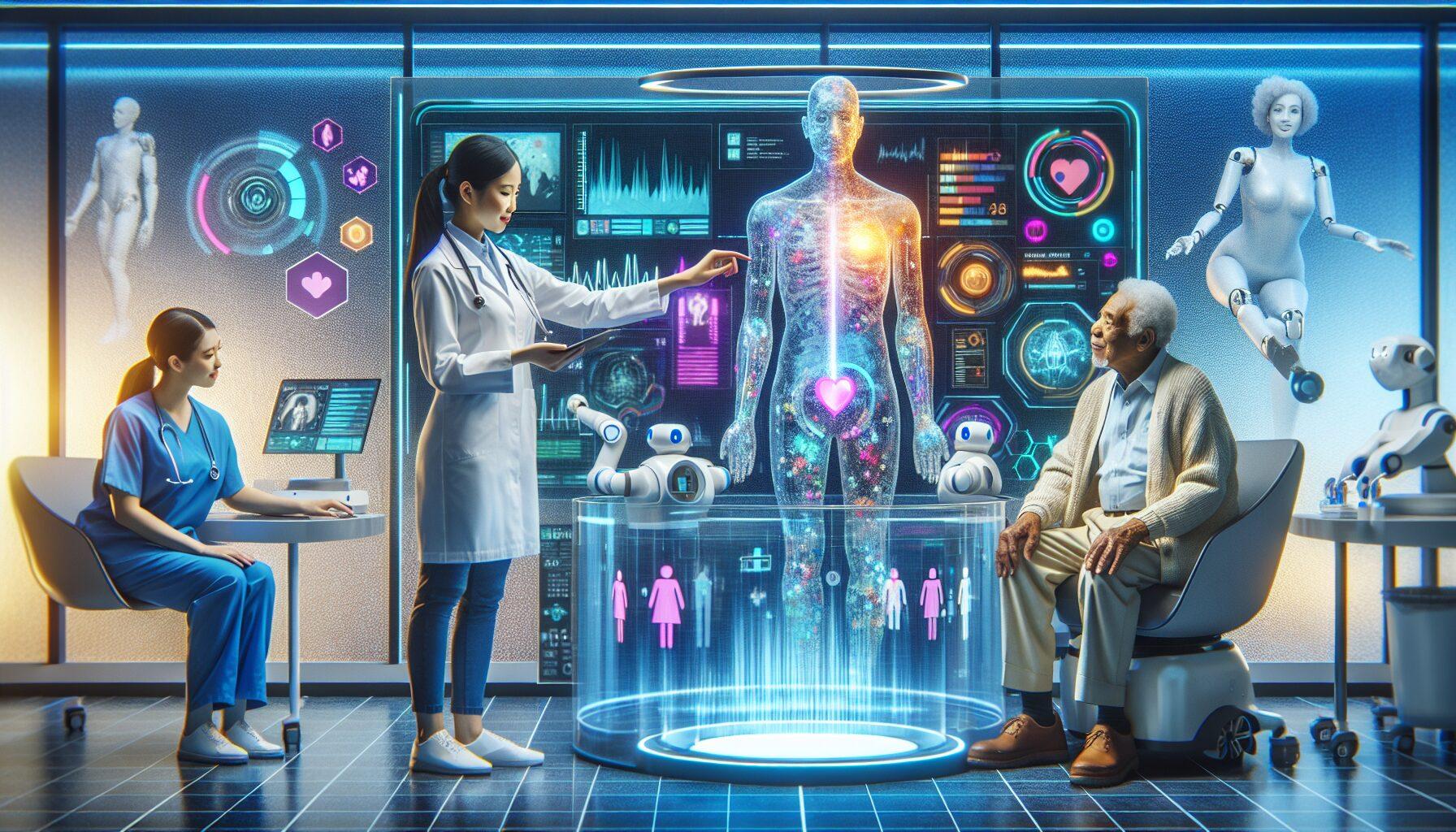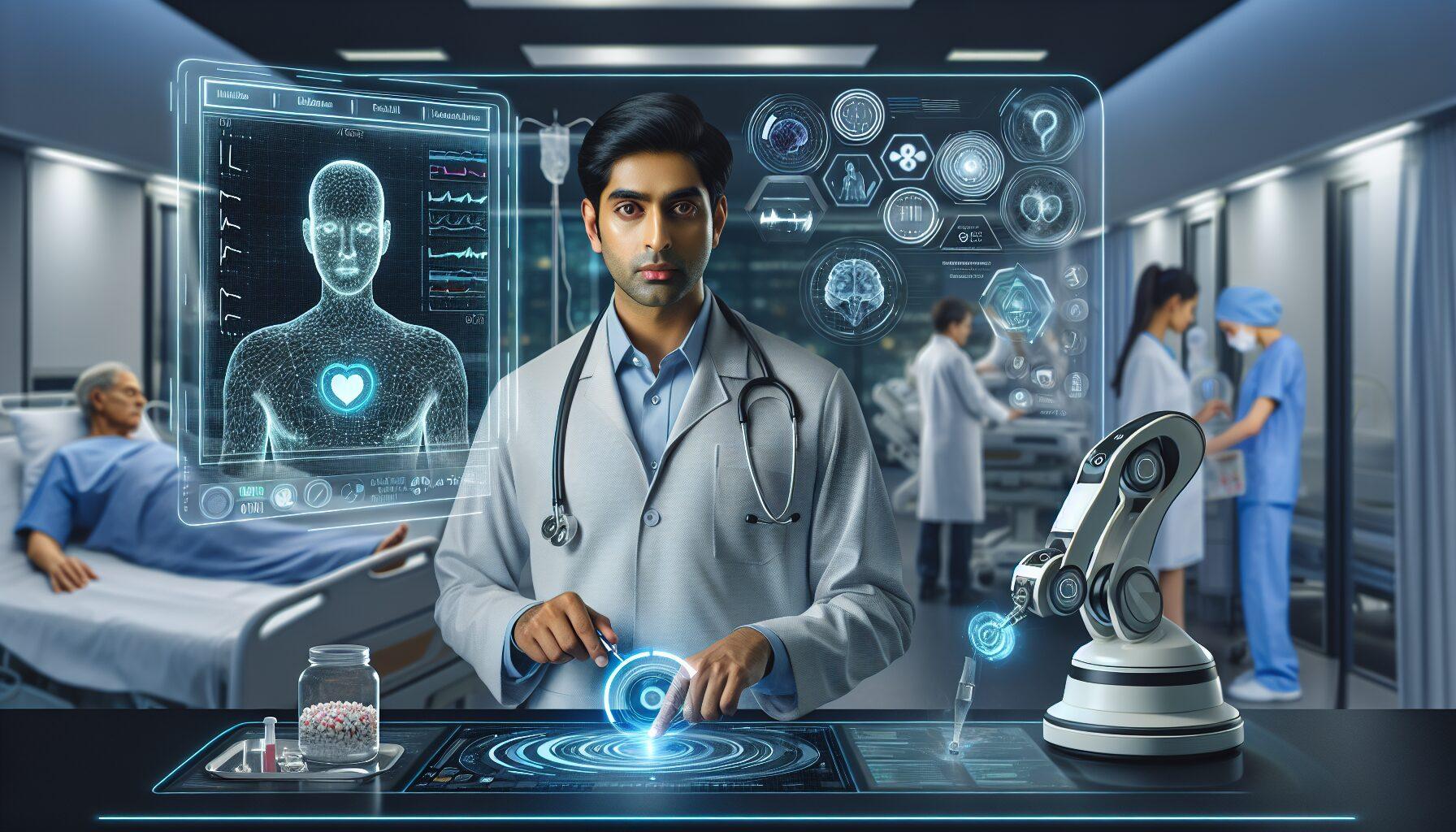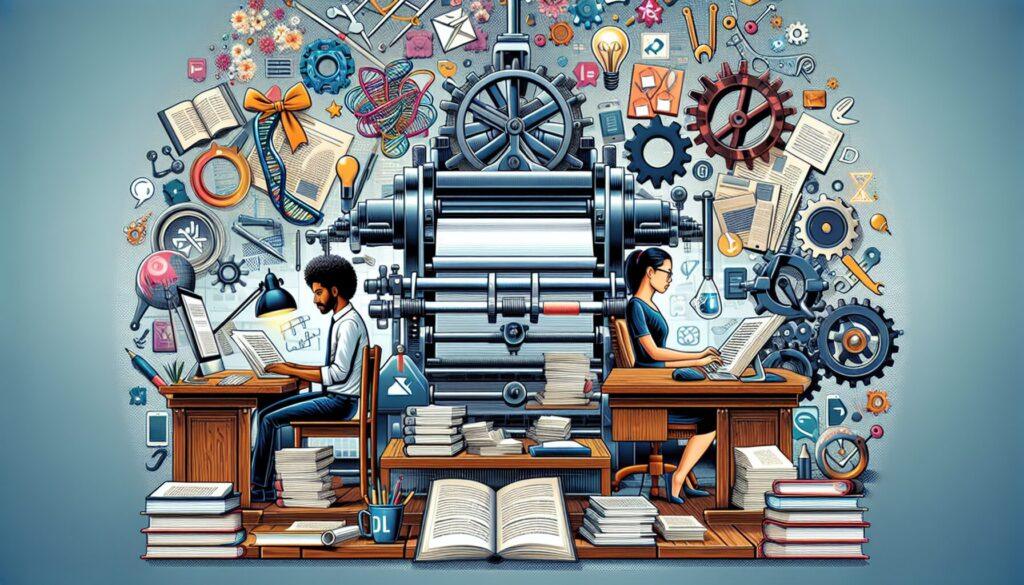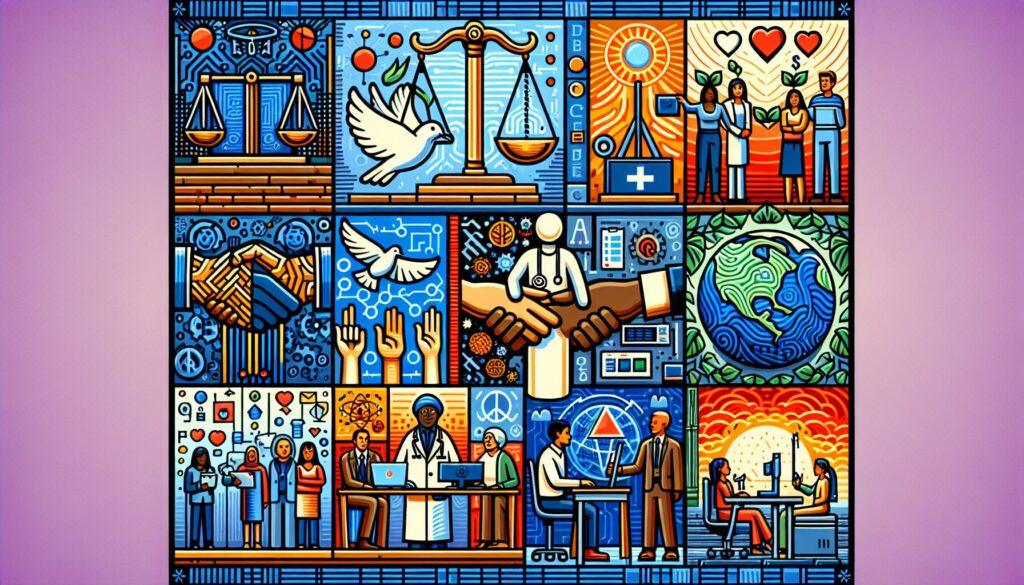AI in Healthcare
AI personalization in healthcare represents a transformative shift towards more tailored and precise medical care. By leveraging vast datasets and sophisticated algorithms, AI systems can analyze a patient’s unique health profile, including genetics, lifestyle, and medical history, to offer individualized treatment plans and wellness strategies.
This approach enhances the accuracy of diagnoses and the efficacy of interventions empowers patients with a more active role in managing their health, leading to improved outcomes and a more personalized healthcare experience.
Imagine a world where your healthcare is tailor-made, particularly for you, not a one-size-fits-all strategy. This might sound like science fiction; however, due to artificial intelligence (AI), it is turning into an actuality.
AI personalization in healthcare represents a paradigm shift, leveraging vast amounts of data to understand patient specifics at a granular level. By analyzing patterns within your genetic makeup, lifestyle choices, and even social determinants of health, AI systems can predict health risks with astonishing accuracy and suggest interventions that are uniquely suited to you.
This not only enhances the efficiency of treatments but also significantly reduces the chances of adverse reactions, ensuring that the care you receive is as effective and safe as possible.
AI is remodeling healthcare by making it extra personalized, environment-friendly, and efficient. Let’s discover how AI is shaping the long run of personalized healthcare and why it issues to you.
What Is Personalized Healthcare, and Why Should You Care?

Personalized healthcare, also known as precision medicine, tailors medical treatment to the individual characteristics of each patient. This approach takes into account factors like genetics, lifestyle, and environment to predict more accurately which treatments will be most effective for specific ailments.
By caring about personalized healthcare, you are advocating for a system that strives to understand you as a unique individual, ensuring that the medical care you receive is not a one-size-fits-all solution but is instead customized to your personal health profile.
Personalized healthcare is all about tailoring medical therapies to your distinctive wants. Instead of generic options, medical doctors use your genetic makeup, lifestyle, and even your day-to-day habits to create a plan that works best for you. Think of it like a custom-made go well with—it suits completely as a result of it’s designed particularly for your physique.
Similarly, AI personalization is revolutionizing the way we interact with technology. By analyzing vast amounts of data about our behavior, preferences, and even our moods, artificial intelligence can tailor digital experiences to our individual personalities.
This means that the apps we use, the content we consume, and even the advertisements we see are becoming more relevant and engaging, as if they were curated by a close friend who knows us inside out.
But right here’s the kicker: AI is the grasp tailor behind this course. It analyzes mountains of knowledge—your medical historical past, lab outcomes, even your health tracker stats—to assist medical doctors in making smarter, quicker choices.
Did You Know?
According to a study by Infosys BPM, AI can predict ailments like diabetes or coronary heart situations years earlier than they occur. That’s like having a crystal ball for your well-being!
How AI Makes Personalized Healthcare Possible
AI personalization in healthcare is revolutionizing the patient experience by tailoring treatments and recommendations to individual genetic profiles, lifestyle choices, and even social determinants of health.
This hyper-personalized approach not only enhances the accuracy of diagnoses but also optimizes the effectiveness of treatment plans, ensuring that each patient receives the most suitable medications and therapies based on their unique biological makeup.
By analyzing vast amounts of data from electronic health records, wearable devices, and even social media, AI algorithms can uncover subtle health trends and risk factors, providing a comprehensive and nuanced understanding of a patient’s health journey. AI isn’t only a buzzword—it’s a game-changer. Here’s the way it’s remodeling healthcare:
1. Predictive Analytics: Catching Problems Before They Start
By leveraging vast datasets and sophisticated modeling, AI-driven predictive analytics can identify individuals at high risk for various conditions long before symptoms manifest.
This proactive approach means healthcare providers can intervene earlier, offering tailored preventative measures or treatments that can halt or slow disease progression.
The result is not only better outcomes for patients but also a more efficient healthcare system that can allocate resources more effectively and potentially reduce overall healthcare costs.
AI can analyze your knowledge to foretell well-being dangers. For instance, in case your health tracker exhibits a sudden drop in exercise ranges, AI may flag it as a possible signal of despair or fatigue.
Real-Life Example:
Apple Watch’s ECG characteristic makes use of AI to detect irregular coronary heart rhythms, doubtlessly saving lives by alerting customers to seek medical consideration.
2. Genetic Medicine: Unlocking Your DNA’s Secrets
Advancing further into the realm of personalized healthcare, AI-driven genetic medicine is revolutionizing how we approach treatment and prevention strategies. By analyzing the vast complexities of an individual’s genetic code, AI algorithms can identify specific genetic markers that predispose a person to certain conditions.
This level of precision not only enables the development of tailored therapies but also allows for predictive measures, giving individuals the power to make informed lifestyle choices to potentially mitigate future health risks.
AI can analyze your genetic code to determine dangers for ailments like most cancers or Alzheimer’s. This means medical doctors can advocate preventive measures tailor-made to your DNA.
Fun Fact:
The Human Genome Project took 13 years to finish in 2003. Today, AI can analyze a genome in simply 26 hours! (Source: Wikipedia)

3. Virtual Health Assistants: Your 24/7 Health Buddy
AI personalization extends beyond analysis and into the realm of ongoing care with virtual health assistants becoming an integral part of our daily lives. These AI-powered companions can provide reminders for medication, schedule doctor’s appointments, and even offer mental health support through conversational interfaces.
By learning our habits and preferences, they can also deliver personalized tips for diet and exercise, making it easier to maintain a healthy lifestyle without feeling overwhelmed by information or decisions.
Ever wished you might ask a health care provider a query at 2 a.m.? AI-powered digital assistants like Ada or Babylon Health can reply to your well-being queries anytime, anywhere.
4. Drug Development: Faster, Smarter, and Cheaper
AI personalization extends beyond just convenience; it’s revolutionizing the way we approach our health and wellness. By leveraging vast datasets and sophisticated algorithms, AI can help identify potential drug interactions or side effects before they become a problem, ensuring that patients receive the most effective and safe medications.
Furthermore, AI-driven platforms are now capable of sifting through medical research at an unprecedented pace, enabling the discovery of new treatments and therapies that could have taken years to uncover through traditional methods.
This not only accelerates the pace of medical innovation but also holds the promise of more personalized and precise healthcare for individuals around the globe.
AI is rushing up drug discovery by analyzing which compounds are most definitely going to work for particular situations. This means new therapies attain sufferers quicker.
AI in Action: Real-Life Success Stories
Beyond the pharmaceutical realm, AI personalization is revolutionizing the patient experience in clinical settings. With the integration of AI-driven tools, healthcare providers can now offer tailored treatment plans based on a patient’s unique genetic makeup, lifestyle, and health history.
This shift towards personalized medicine not only enhances the effectiveness of treatments but also significantly reduces the risk of adverse side effects, ensuring a safer and more responsive healthcare journey for each individual. Let’s get actual—AI isn’t simply theoretical. It’s already making waves in healthcare:
1: IBM Watson for Oncology: IBM Watson for Oncology is a trailblazer, harnessing the power of AI to revolutionize cancer care. By analyzing the meaning and context of structured and unstructured data in clinical notes and reports, Watson helps physicians identify treatment options tailored to each patient’s unique disease and genetic profile.
This advanced AI system is trained by world-class oncologists and ingests massive volumes of medical literature, staying up-to-date with the latest research to support informed decision-making in real-time.
With Watson, the promise of personalized medicine is becoming a reality, offering hope for more effective and individualized cancer treatments. This AI system helps medical doctors create personalized cancer remedy plans by analyzing medical literature and affected person knowledge.
2: Building on the capabilities of AI systems like Watson, researchers and clinicians are now able to delve into the genetic makeup of individual tumors. By doing so, they can identify specific mutations and tailor treatments that target those unique characteristics.
This level of precision not only increases the efficacy of treatments but also minimizes the potential side effects, as therapies are designed to attack cancer cells with minimal impact on healthy tissue. Google’s DeepMindused AI to foretell acute kidney harm 48 hours earlier than it occurred, giving medical doctors a head start on a remedy.
The Pros and Cons of AI in Healthcare
| Pros | Cons |
|---|---|
| Faster analysis and remedy | Privacy issues with knowledge sharing |
| Personalized care plans | High implementation prices |
| Early illness detection | Risk of over-reliance on expertise |
| Improved affected person outcomes | Potential for bias in AI algorithms |
Interactive Element: Quiz Time!
How Much Do You Know About AI in Healthcare?
- What proportion of healthcare organizations are already utilizing AI?
a) 20%
b) 50%
c) 75%
(Answer: b) 50%—AI is already an enormous participant in healthcare!)
Tips for Embracing AI-Powered Healthcare

1: Stay Informed: Partner with Ethical AI Providers: It’s crucial to choose AI solutions that prioritize patient privacy and data security. Look for providers who are transparent about their algorithms and are committed to ethical AI practices. This not only protects your patients but also builds trust in AI-driven healthcare services. Keep up with the most recent AI healthcare instruments and apps.
2: Share Your Data (Wisely): Embrace Continuous Learning: Staying ahead in the rapidly evolving field of AI-driven healthcare requires a commitment to ongoing education and training. Encourage your team to participate in workshops, webinars, and conferences to keep their skills sharp and understanding current.
By fostering a culture of learning, you ensure that your organization not only adapts to the latest advancements but also proactively shapes the future of personalized patient care. The more knowledge AI has, the higher it may possibly assist you. But all the time guarantee your knowledge is safe.
3: Ask Questions: Embrace Change: As AI personalization continues to evolve, it’s crucial to remain flexible and open to the transformative possibilities it presents. By embracing change, healthcare professionals can harness the power of AI to deliver more precise and individualized treatment plans.
This willingness to adapt is not just about keeping up with technology; it’s about committing to improve patient outcomes and experiences continuously. Don’t hesitate to ask your physician how AI is being used in your care.
FAQs About AI in Personalized Healthcare
Q: Is AI changing medical doctors?
A: Absolutely, AI is revolutionizing the role of medical doctors by augmenting their capabilities to diagnose and treat diseases. With advanced algorithms, AI can analyze vast amounts of medical data, identify patterns that might be invisible to the human eye, and suggest personalized treatment plans.
Doctors are now equipped with AI-driven insights that can lead to more accurate diagnoses, improved patient monitoring, and tailored healthcare strategies that align closely with an individual’s unique genetic makeup, lifestyle, and health history. Nope! AI is software to assist medical doctors, not substitute them. Think of it as a super-smart assistant.
Q: Is my knowledge protected with AI?
A: Absolutely! One of the paramount concerns with AI in healthcare is the protection of sensitive personal information. Rest assured, AI systems used in medical settings are designed with robust security measures that comply with healthcare regulations like HIPAA in the United States.
These systems employ advanced encryption and data anonymization techniques to ensure that your medical records and genetic information remain confidential and secure from unauthorized access. So, while AI is busy personalizing your healthcare experience, it’s also safeguarding your privacy with the digital equivalent of a lock and key.
Reputable healthcare suppliers use strict safety measures to guard your knowledge. Always verify their privacy insurance policies.
Q: Can AI actually predict ailments?
A: Absolutely, AI has made significant strides in the field of predictive diagnostics. By analyzing vast datasets of patient information, AI algorithms can identify patterns and correlations that may escape even the most experienced medical professionals.
This advanced analysis enables the early detection of conditions such as heart disease, diabetes, and various forms of cancer, often before patients show any symptoms. As a result, individuals can receive timely interventions that can dramatically improve outcomes and potentially save lives.
However, the effectiveness of these predictions is heavily dependent on the quality and quantity of data available, as well as the sophistication of the AI models in use. Yes! AI can analyze patterns in your knowledge to foretell dangers, but it surely’s not foolproof. Regular check-ups are nonetheless important.
Why This Matters to You
Understanding the intricacies of AI personalization is crucial, especially as it becomes more integrated into our daily lives. By leveraging AI, businesses can deliver highly customized experiences to consumers, which can lead to increased satisfaction and loyalty.
However, it’s important to recognize that while AI can significantly enhance personalization efforts, it also raises concerns about privacy and data security that must be addressed responsibly. As consumers, being aware of how our data is being used to shape these personalized experiences is key to maintaining control over our digital footprint.
Personalized healthcare isn’t simply for the rich or tech-savvy—it’s for everybody. AI is making it simpler, quicker, and extra reasonably priced to get care that’s tailor-made to you. Whether it’s predicting a well-being threat or helping your physician select the very best remedy, AI is right here to make your life more healthy and happier.
Ready to Embrace the Future?
As we stand on the brink of a new era in healthcare, AI personalization is not just a futuristic concept—it’s a present reality. With algorithms that can analyze your genetic makeup, lifestyle, and even your social media activity, AI offers a holistic view of your health like never before.
This means that the days of one-size-fits-all medicine are waning, giving way to a new paradigm where treatments and wellness plans are as unique as your own DNA. Embracing AI personalization is embracing a future where healthcare is more effective, more intuitive, and deeply aligned with who you are.
AI is remodeling healthcare, and the long run seems vivid. If you’re interested in how AI can enhance your well-being, begin by exploring apps like Ada or speaking to your physician about AI-powered instruments. Your well-being deserves the very best—and AI is right here to ship.
External Links:
So, what do you suppose? As we continue to witness the integration of AI into the healthcare sector, it’s important to recognize the profound impact it has on patient care. Tailored treatments and personalized medical advice are no longer futuristic concepts but are becoming everyday realities, thanks to the advancements in AI technology.
By leveraging the vast amounts of data from the Human Genome Project and the analytical prowess of systems like IBM Watson for Oncology, medical professionals can now offer care that is as unique as the genetic makeup of their patients. Are you able to let AI assist you in taking care of your well-being? Let us know in the feedback below!


